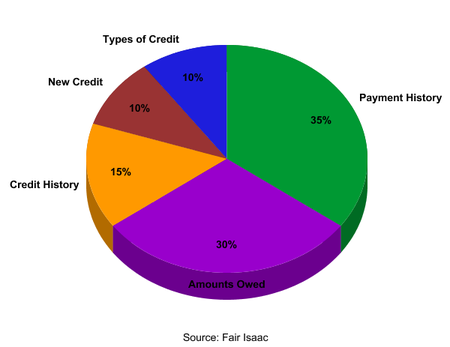The mightiest credit score in the land is the “FICO score.” It was created by a company called Fair Isaac, which recently changed its name simply to FICO.
FICO scores are the most important credit scores to keep track of because they are relied upon most by the banks and lenders that determine your creditworthiness.
The credit score scale for FICO scores ranges from 300-850, with higher scores considered excellent credit and lower scores deemed poor credit. The average credit score for FICO was last calculated at 711 in October 2009.
How is a FICO Score Determined?

The most important scoring factor for the FICO score is payment history. It accounts for 35% of your score, and includes the number of accounts paid as agreed and those past due. For those past due, it factors in the amounts past due and the severity of the delinquencies, such as whether are in collection or charge-off status.
Adverse public records, such as bankruptcies, judgements, foreclosures, lawsuits, liens, and wage attachments also fall under this category.
The next most important scoring metric is amounts owed, which makes up 30% of your FICO score. This includes amounts owed on all accounts, and amounts owed on specific accounts. Additionally, it looks at the number of accounts with balances, proportion of credit lines used, and proportion of installment accounts with a balance.
Length of credit history is the third biggest scoring factor, accounting for 15% of your FICO score. It includes time since accounts were opened, overall and by specific type of account, and time since account activity.
Finally, new credit and types of credit used each account equally for the remaining 20% of your FICO score.
New credit includes the number of recently opened accounts, the number of recent credit inquiries, time since recent account opening(s) by type of account, time since credit inquiry(s), and re-establishment of positive credit history since past payment problems.
Types of credit are also looked at, and they say it’s beneficial to have a good mix of credit. For example, a consumer with an auto loan, mortgage, and credit cards will likely be viewed more favorably than a consumer who only has credit cards.
What’s Not In Your FICO Score?
The following items are not considered when determining your FICO score:
– Race, color, religion, national origin, sex, marital status
– Age, salary, occupation, title, employer, employment data
– Where you live
– Interest rates being charged on accounts
– Certain types of inquiries (only those made by lenders count against you)
– Any information not in your credit report or not proven to be predictive of future credit performance
How Do I Get My FICO Score?
Perhaps the best place to get your FICO score is via MyFICO.com, which sells it directly. You can also get it from two of the three major credit reporting agencies. Experian is the only one that no longer offers it, as a dispute between the pair severed their relationship. Experian now pitches a rival proprietary credit score called VantageScore.
You can also obtain so-called “Fako scores” from a variety of sources, most often the free credit score companies. These are typically based on the FICO scoring algorithm, but are not true FICO scores. It’s unclear if it matters all that much, since the scoring is probably pretty darn close.
There’s also the FICO Score Estimator, which gives you an estimate of your FICO score based on information you provide. The problem with this is that you might not know about everything in your credit history, so it may not be all that helpful if unexpected items pop up on your credit report. To avoid surprises, you can order a free credit report from the government and then run the estimator.
How To Improve Your FICO Score
The best way to improve your FICO score is to make on-time payments, keep balances low, and apply for new credit sparingly. That, along with a good mix of credit, will ensure you have at least a good credit score, and perhaps an excellent one.
Establishing good credit is no great mystery, it just takes time and a little bit of effort. After all, they’ve spelled it all out for us, as we’ve shown you above.